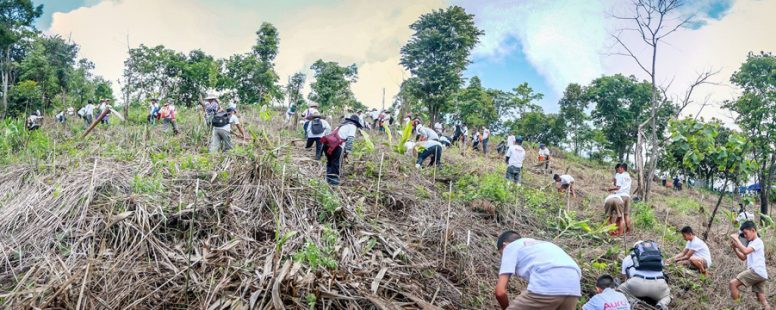Payment for Environmental Service Forest Restoration Project, Chiang Mai Province, Thailand
Posted on behalf of Eza King, Master’s Candidate
Research Center for Social Science and Sustainable Development, Chiang Mai University, Thailand
The residents of Pong Khrai village in Chiang Mai Province, northern Thailand have a reputation for being conservation minded. I wasn’t sure exactly what this meant but the staff at Lowering Emissions in Asia’s Forests (LEAF) Thailand had assured me, ‘Just go there. You can see it.’ What I found when I arrived in Pong Khrai was a gentle valley full of small entrepreneurial activities and indeed, full of trees. What impressed me even more were the stories that began to illuminate the evolution of environmental governance in this area.
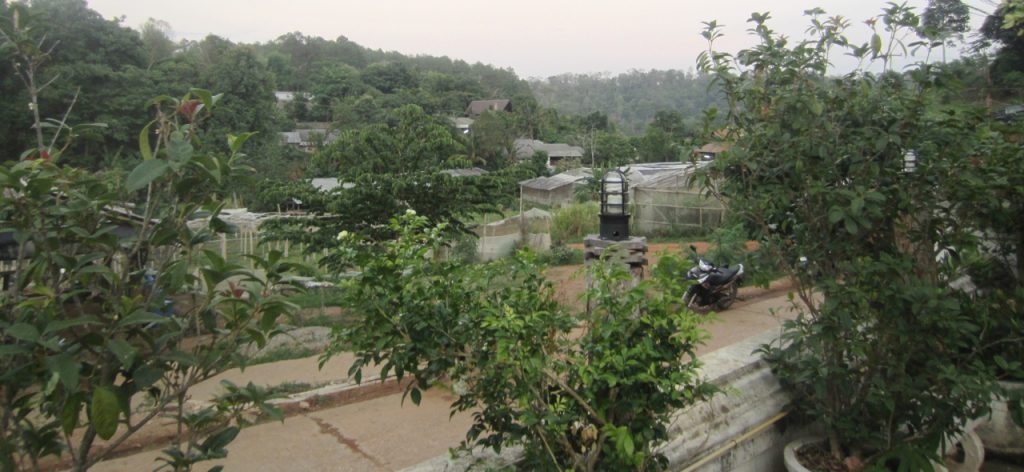
Greenhouses in Pong Khrai village
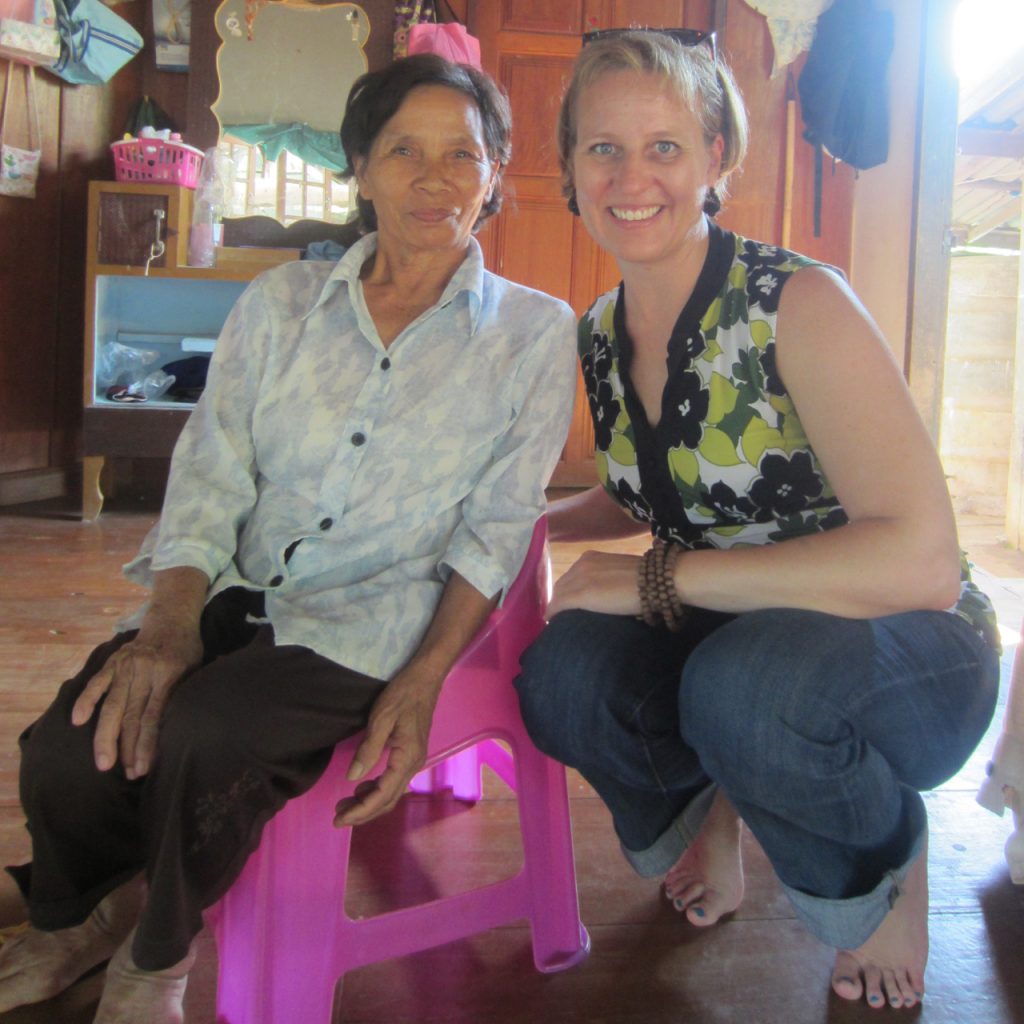
Interview with Pong Khrai elder
One elder spoke of the days when residents of Pong Khrai would burn forests to clear farm land and remembered occasions when fires got out of hand. That was before the Forest Department visited with new opinions on proper forest management. Now the village had organized to fund and build firebreaks and coordinates around the clock volunteers with 20 hand held radios during the increased fire threat of the dry season. Another resident recalled voluntary agreements to protect large trees in certain areas and participating in tree ordination ceremonies as long as 20 years ago to help conserve trees by ‘ordaining’ them as sacred. More recently the village had coordinated numerous attempts to plant trees but notably the tree survival rates were very low.
The nearby Aura Mineral Water Company (Aura), owned by Tipco Foods PCL, has an established corporate social responsibility program that had also previously attempted community tree plantings. However, the plant manager felt disappointed with these programs as he felt that after the photo of the project was taken the trees were not looked after and many did not survive. So how is it that Aura and the residents of Pong Khrai connected to negotiate a payment for environmental service project? What was necessary so that this time the trees would survive?
Through a presidential initiative at the international level, the United States Agency for International Development funded the five-year LEAF project (2011-2016), overseen by Winrock International, that focused its efforts in Thailand, Cambodia, Laos, Vietnam, Papua New Guinea, and Malaysia. LEAF Thailand was asked by its Thai counterpart the Department of National Parks, Wildlife and Plant Conservation to focus its efforts in the Chiang Mai Province in northern Thailand. The two main staff at LEAF Thailand in Chiang Mai spent several years laboring to introduce the concept of payment for environmental services to local businesses and communities. While many expressed interest in the concept no one was willing to commit until Aura agreed to use emergency funds to attempt a pilot. LEAF Thailand still had a long way to go. It had to find a community willing to participate, get approval for land that could be used for the project and create a mechanism that could oversee the project after their role in facilitating the agreement was complete.
While Pong Khrai’s reputation and location in the same watershed as Aura made it an obvious choice, the village headman was hesitant about the amount of labor needed to be successful. He knew the funds were mainly to be used for buying tree seedlings and fertilizer and therefore the labor would have to be mainly from volunteers. Still the village headman could not see how he would have been able to mobilize the necessary volunteer labor without the small budget that allowed them to provide some lunch meals and some gas to get people to and from the somewhat remote planting site.
At first impression, I thought that 10 rai (~4 acres) was a very small area of land to reforest. This was before I understood the incredible amount of time and labor required to weed a plot of land this size and protect it from wild fires. In the end, it was the resident’s strong belief that healthy forests would benefit their own water supply as much as it would Aura that persuaded them to participate.
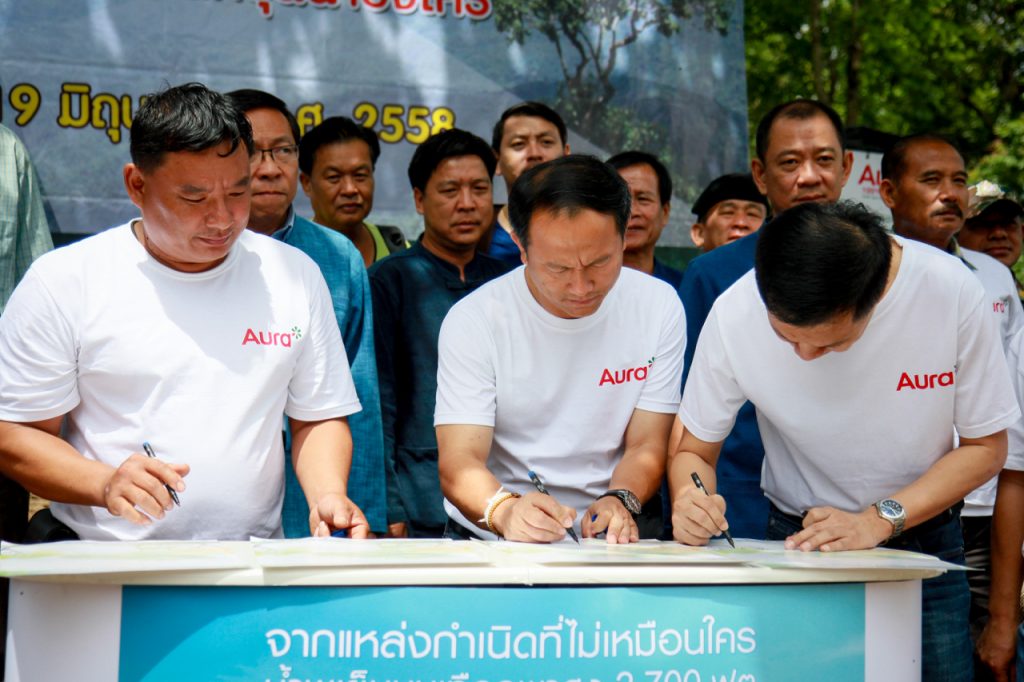
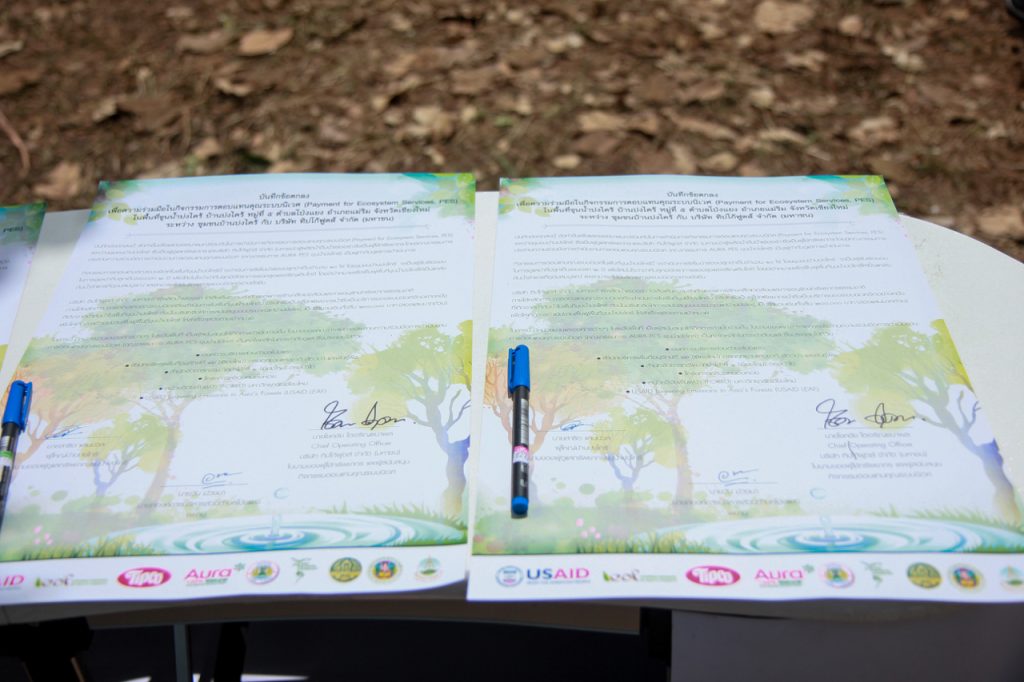
Pong Khrai village headman, Sub-district Mayor and Aura representative signing AURA PES agreement.
(source: LEAF Thailand Staff)
Payment for environmental service agreements negotiated between private businesses and communities are new in this area and LEAF Thailand had to overcome many barriers including perceptions of social status and lack of negotiating experience. Eventually an agreement was signed in which Aura was the sole buyer, paying Pong Khrai as the sole seller, 200,000 baht (~$6,000 USD) for water-related environmental services associated with reforesting 10 rai of land (~4 acres) over two years. An AURA PES Committee was formed to represent the various stakeholders in overseeing the project and navigating any challenges they might encounter. Several local authorities worked with Pong Khrai to approve the plot of land for the project. A huge kick-off day was organized for the signing of the agreement and planting of the trees.

Volunteers planting more than 3,300 trees during AURA PES planting day
(source: LEAF Thailand Staff)
LEAF Thailand also facilitated and funded trainings in new expertise by Chiang Mai University’s Forest Restoration Research Unit (FORRU). FORRU provided the residents of Pong Khrai with new knowledge and skills about forest restoration that included site and seedling preparation, monitoring techniques, species selection and financial planning. The FORRU method encouraged more than 25 different species of trees be planted in order to recreate more than just a tree plantation but instead a forest habitat in as short as seven years. Pong Khrai residents already knew how to plant trees but FORRU trained them in the importance of on-going weeding, plant selection and planting density and the importance of the time of year in which the trees were planted. Without these new expertise, the survival rate of the trees could not have been expected to be any higher than previous attempts.
As of May 2017, all of the provisions of the AURA PES agreement have been fulfilled and all payments were made in full. By collaborating in this new form of environmental governance the AURA PES project stakeholders finally realized the goal of successfully keeping trees seedlings alive in order to restore forestland. This would not have been possible without the funds provided by Aura, the new expertise provided by FORRU, the approval of the local authorities and the self-motivation of Pong Khrai that mobilized the large amount of volunteer labor. Additionally, LEAF Thailand played a pivotal role in facilitating the negotiation of the agreement and establishing a committee that could oversee the project. A second agreement has been signed and initiated by the AURA PES Committee without the assistance of LEAF Thailand to replicate the project for a second time. After the second project the Pong Khrai village headman said that they plan to take a break due to the very intensive labor needs that are required to fulfill their part of the agreement.

